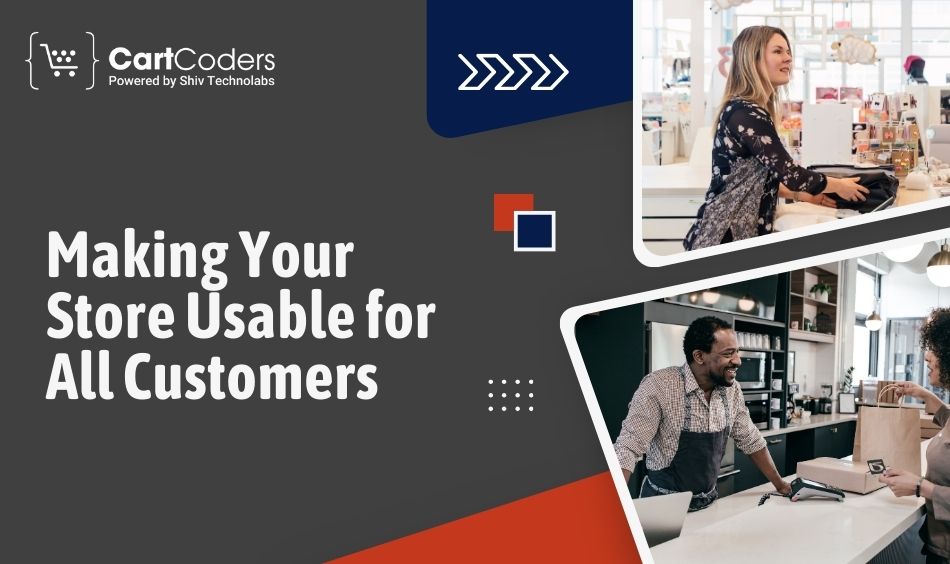Custom Engagement Solutions
Unlock tailored solutions with a free, no-obligation strategy session.
Expert Developers & Engineers on Demand
Scale Your Team with Skilled IT Professionals
Expert Guidance for Digital Transformation

In today’s competitive eCommerce environment, making your Shopify store accessible isn’t just a good practice—it’s essential for widening your audience and improving your overall customer experience. A Shopify accessibility app helps ensure that everyone, including those with disabilities, can navigate and use your store with ease. By integrating such an app, you unlock many advantages for your business and your customers. Let’s dive into ten significant benefits of installing a Shopify accessibility app.

An accessibility app improves the overall usability of your Shopify store by making it easier for everyone to navigate, regardless of their ability level. Features such as keyboard navigation, adjustable text sizes, and screen reader compatibility allow customers with disabilities to interact with your store more effectively. These improvements don’t just benefit disabled users; they also create a more fluid experience for everyone who visits your site.
Many accessibility apps come with tools that cater to visual, auditory, and motor impairments, which can significantly improve your site’s layout and functionality. For example, users with vision issues may struggle to read small text, but by implementing features that allow users to enlarge text or adjust color contrasts, your store becomes more user-friendly for everyone.
In many regions, failing to make your website accessible can lead to legal issues. For example, businesses in the U.S. need to follow the Americans with Disabilities Act (ADA), and in Europe, the European Accessibility Act imposes similar requirements. Installing an accessibility app helps you comply with these laws, protecting your business from potential lawsuits or fines.
Also Read:- Top 10 Best Shopify Accessibility Apps – ADA & WCAG Compliance
Incorporating features from an accessibility app keeps your store compliant with the Web Content Accessibility Guidelines (WCAG), ensuring that you meet the necessary standards. This prevents issues later down the road as laws and regulations continue to become more stringent on digital accessibility.

More than a billion people worldwide live with some form of disability. Failing to make your store accessible means you could be losing out on a huge potential customer base. An accessibility app can help open the doors to more users by eliminating obstacles for those who may otherwise have difficulty interacting with your store.
Accessible websites are not only beneficial for people with disabilities. Many people prefer customization options such as larger text, voice-enabled browsing, or higher contrast modes for easier reading. When you cater to these preferences, you appeal to a wider audience, helping boost traffic and potential sales.
Accessibility features are often aligned with best practices for search engine optimization (SEO). For example, adding alternative text for images, proper HTML structure, and descriptive headings can significantly improve your SEO performance. Google and other search engines value these attributes when determining your website’s ranking.
By using an accessibility app, you ensure that your site incorporates these features, improving its visibility in search results. The higher your site ranks, the more organic traffic you receive, which translates to better overall performance for your Shopify store.
In an era where consumers care about inclusivity and social responsibility, having an accessible website can boost your brand’s image. Customers are more likely to trust and support businesses that demonstrate a commitment to inclusivity and fairness.
Installing a Shopify accessibility app shows that your brand is conscious of different needs and that you value every customer’s experience. By aligning your business with ethical practices, you create a positive brand reputation, encouraging customer loyalty and word-of-mouth recommendations.
As the digital landscape continues to evolve, stricter accessibility regulations are likely to come into place. By integrating an accessibility app now, you future-proof your Shopify store against potential changes in the law. Instead of scrambling to make adjustments later, your business will already be prepared for any new accessibility requirements.
This proactive approach can save you time and money in the long run. Not only will you avoid the headache of overhauling your website to meet future standards, but you’ll also maintain a consistent and reliable user experience for your customers.
When users encounter barriers while browsing, such as difficulty reading text or navigating your site, they are more likely to leave without making a purchase. By making your Shopify store more accessible, you create a welcoming environment where users can stay longer and engage with your content.
Lowering your bounce rate by improving site accessibility can also help your SEO performance, as search engines favor websites that engage users for extended periods. Increased time on site can lead to higher conversions, benefiting both your customers and your bottom line.
For any eCommerce business, conversion rates are key to success. Accessibility barriers can prevent customers from completing their purchases, which can directly affect your revenue. With an accessibility app, you remove these barriers, allowing all users to complete the checkout process without issues.
Whether it’s a simple adjustment in how a form is filled out or how easily someone can navigate the shopping cart, removing friction from the buying process is essential. This makes it easier for users with disabilities to finish their transactions, increasing the likelihood of higher conversion rates across the board.
Accessibility demonstrates that your business values every customer equally. When customers, especially those with disabilities, feel valued and accommodated, they are more likely to return for future purchases. Building trust is critical in eCommerce, where competition is fierce, and customers can easily find alternatives.
By creating an accessible environment, you encourage repeat visits and long-term loyalty. People tend to stick with brands that prioritize their needs and provide consistent, positive experiences.
Being an ethical business is no longer optional; it is expected. By making your Shopify store accessible, you contribute to a more inclusive and fair digital environment. This not only reflects well on your business but also aligns with global movements toward inclusivity in technology.
An accessible Shopify store can become a part of your company’s social responsibility strategy, demonstrating that you care about all potential customers, regardless of their abilities. By making your store accessible, you set an example for others and contribute to a larger mission of inclusivity in online commerce.
Selecting the right accessibility app for your Shopify store is crucial for ensuring that your site is both user-friendly and compliant with legal standards. With many options available, here are some key factors to consider when making your choice:
Not all accessibility apps work seamlessly with every Shopify theme. It’s important to choose an app that is fully compatible with your store’s design and layout to avoid any functionality issues. Before committing to an app, check reviews or contact the developer to ensure smooth integration with your current theme.
Different stores have different needs when it comes to accessibility. Some apps offer a variety of customization options, such as adjustable text sizes, color contrast controls, and screen reader compatibility. Choose an app that allows you to customize settings to fit your store’s specific requirements and your customers’ needs.
Ensuring that the app adheres to global accessibility standards like the Web Content Accessibility Guidelines (WCAG) is essential. The right app should provide features that help your store meet these legal requirements, reducing the risk of lawsuits and helping you stay compliant with local and international regulations.
Accessibility standards and technology are constantly evolving. Choose an app that is regularly updated to reflect these changes. It’s also important to select an app with reliable customer support, in case you need assistance with setup or troubleshooting.
Checking reviews from other Shopify merchants can provide valuable insights into an app’s performance. Look for feedback on ease of use, compatibility, and the effectiveness of accessibility features. Apps with high ratings and positive reviews are more likely to meet your store’s needs.
Installing a Shopify accessibility app provides numerous benefits that go beyond legal compliance. By creating an inclusive online store, you improve usability, boost SEO performance, increase engagement, and build long-lasting customer relationships. Making your Shopify store accessible ensures that no potential customer is left behind, opening doors to new audiences and increasing your store’s potential for growth.
By taking steps to make your website accessible, you demonstrate that your business is forward-thinking, inclusive, and committed to providing a superior user experience for all. Ultimately, an accessible store is not only good for your customers—it’s good for your business.
For expert assistance in making your Shopify store more inclusive, CartCoders offers top-notch Shopify Accessibility Implementation services. Our team also provides comprehensive Shopify development services to ensure your eCommerce platform is optimized for all users. Contact CartCoders today for personalized solutions!
FAQs
1. What is an accessibility app, and why do I need it for my Shopify store?
An accessibility app helps make your Shopify store more usable for people with disabilities by offering features like text resizing, color contrast adjustments, and screen reader support. These apps ensure that your store meets legal requirements and provides an inclusive shopping experience for all visitors.
2. How do I know if my Shopify store is accessible?
You can test your store’s accessibility by using tools like accessibility scanners or installing an app that checks for compliance with standards like WCAG. Many Shopify accessibility apps provide built-in testing and reporting features to help you identify and address potential accessibility issues.
3. Do accessibility apps affect my store’s speed or performance?
Most well-optimized accessibility apps are designed to have minimal impact on your store’s loading speed. However, it’s always a good idea to test the app before fully implementing it to ensure there is no significant effect on performance. Reviews can also help you determine how lightweight an app is.
4. Can I customize the features of an accessibility app to suit my store?
Yes, many accessibility apps offer a range of customization options to fit your store’s design and customer needs. You can typically adjust features like text size, color contrasts, and keyboard navigation to make the shopping experience more inclusive for everyone.
5. Is it necessary to install an accessibility app if my theme already has built-in accessibility features?
While some Shopify themes come with basic accessibility features, an app can offer more advanced options and ensure full compliance with legal standards. Installing an accessibility app provides additional layers of usability and makes sure your store is accessible to a wider range of customers.
Projects delivered in 15+ industries.
95% retention rate, building lasting partnerships.
Serving clients across 25+ countries.
60+ pros | 10+ years of experience.